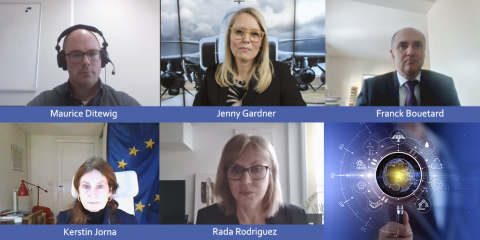Strengthening Europe's global technology leadership
12 February 2021

What does global technology leadership mean to you? This was the first interactive poll question posed to the more than 150 attendees of Orgalim's Industrial Strategy in Focus roundtable for EU Industry Week this Thursday. The resounding answer: having a strong industry to lead the way.
Just a month before the updated EU Industrial Strategy is due to be released, the timely event brought together high-level panellists from the European Commission and industry to dive into how advanced manufacturing can empower Europe to lead the next global wave of industrial transformation. The discussion was ably moderated by Jenny Gardner, Head of Strategy C2S at Saab.
Opening for the Commission, Kerstin Jorna, Director General Internal Market, Industry, Entrepreneurship and SMEs, underlined the key role of industry in enabling the twin green and digital transition as well as in building greater resilience in the wake of the current COVID crisis. "When we adopted the new Industrial Strategy in 2020, the clear objective was to facilitate industry's ability to lead the twin transition to climate neutrality and digital leadership, towards increased competitiveness on the global stage – and that is still the purpose of our industrial policy," she stressed. "And we see that the twin transition will require profound transformation of our industry."
The adoption of advanced manufacturing technologies on a global scale can dramatically increase the connectedness of global value chains and unlock new data-driven business models.
That profound transformation, said Orgalim President Rada Rodriguez, is unlocked by applying emerging technologies like the Internet of Things, robotics, artificial intelligence and additive manufacturing, to improve processes and enable the manufacture of complex products: advanced manufacturing, in other words. "Today, Europe already has a leading position when it comes to advanced manufacturing, and it's important that Europe builds on this strength," she pointed out. "The adoption of advanced manufacturing technologies on a global scale can dramatically increase the connectedness of global value chains and unlock new data-driven business models."
Ericsson France CEO Franck Bouétard emphasised notably how implementing 5G technologies can bring huge benefits for manufacturing. "5G enables much lower latency which will have a massive impact on our industries," he said. Ericsson has been working with Mercedes Benz, for example, initially on real time data management, connecting the full manufacturing chain, and now progressively on connecting the robots using 5G. Their target is to increase productivity by 15% by 2022 and to achieve a zero carbon factory.
In case you missed the event, you can access the full recording here and download the slides below. We talked further with Maurice Ditewig recently for our In Conversation with... series and will be sharing our Conversation with Franck Bouétard soon too.
Our Industrial Strategy in Focus series continues on 18 March with an expert roundtable on the evolution of the EU-US trade relationship. Registration for that event is now open and we warmly invite you to join us for another lively discussion.
Be sure to follow us on Twitter and subscribe to our newsletter for the latest updates.

LATEST NEWS
How can we create a dynamic, competitive European high-tech manufacturing base?
Orgalim's key recommendations offer policymake...
